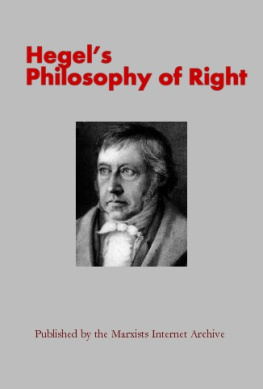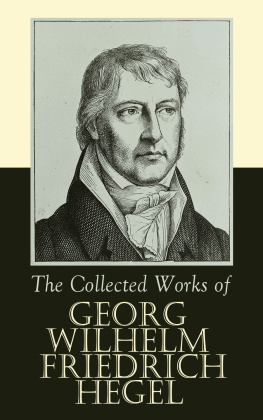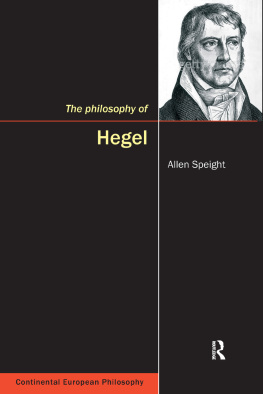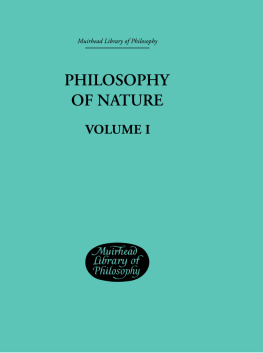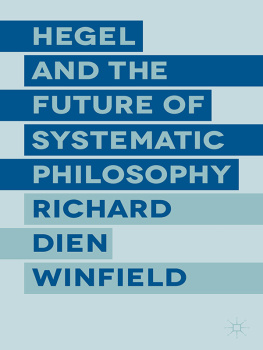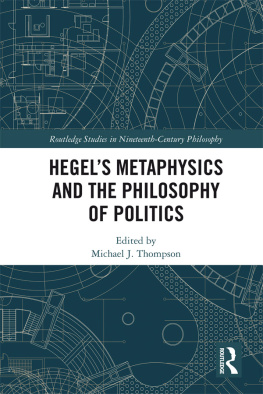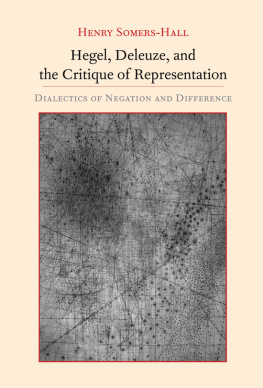Hegel - The Philosophy of Right
Here you can read online Hegel - The Philosophy of Right full text of the book (entire story) in english for free. Download pdf and epub, get meaning, cover and reviews about this ebook. publisher: Marxists Internet Archive, genre: Science. Description of the work, (preface) as well as reviews are available. Best literature library LitArk.com created for fans of good reading and offers a wide selection of genres:
Romance novel
Science fiction
Adventure
Detective
Science
History
Home and family
Prose
Art
Politics
Computer
Non-fiction
Religion
Business
Children
Humor
Choose a favorite category and find really read worthwhile books. Enjoy immersion in the world of imagination, feel the emotions of the characters or learn something new for yourself, make an fascinating discovery.
The Philosophy of Right: summary, description and annotation
We offer to read an annotation, description, summary or preface (depends on what the author of the book "The Philosophy of Right" wrote himself). If you haven't found the necessary information about the book — write in the comments, we will try to find it.
Hegel: author's other books
Who wrote The Philosophy of Right? Find out the surname, the name of the author of the book and a list of all author's works by series.
The Philosophy of Right — read online for free the complete book (whole text) full work
Below is the text of the book, divided by pages. System saving the place of the last page read, allows you to conveniently read the book "The Philosophy of Right" online for free, without having to search again every time where you left off. Put a bookmark, and you can go to the page where you finished reading at any time.
Font size:
Interval:
Bookmark:
First Published :by G Bell, London, 1896. Translated :by S W Dyde, 1896.
Preface and Introduction with certain changes interminology: from Philosophy of Right, by G W F Hegel 1820, Translated.Prometheus Books; Remainder: from HegelsPhilosophy of Right, 1820, translated, Oxford University Press; First Published : by Clarendon Press1952, Translated : with Notes byT M Knox 1942.
Table of Contents
THE immediate occasion for publishing these outlines is the needof placing in the bands of my hearers a guide to my professional lectures uponthe Philosophy of Right. Hitherto I have used as lectures that portion of the Encyclopaedia of the Philosophic Sciences (1817) which deals with this subject. The present work covers the same groundin a more detailed and systematic way.
But now that these outlines are to be printed and given tothe general public, there is an opportunity of explaining points which inlecturing would be commented on orally. Thus the notes are enlarged in order toinclude cognate or conflicting ideas, further consequences of the theoryadvocated, and the like. These expanded notes will, it is hoped, throw lightupon the more abstract substance of the text, and present a more complete viewof some of the ideas currant in our own time. Moreover, there is alsosubjoined, as far as was compatible with the purpose of a compendium, a numberof notes, ranging over a still greater latitude. A compendium proper, like ascience, has its subject-matter accurately laid out. With the exception,possibly, of one or two slight additions, its chief task is to arrange theessential phases of its material. This material is regarded as fixed and known,just as the form is assumed to be governed by well-ascertained rules. A treatisein philosophy is usually not expected to be constructed on such a pattern,perhaps because people suppose that a philosophical product is a Penelopes webwhich must be started anew every day.
This treatise differs from the ordinarycompendium mainly in its method of procedure. It must be understood at theoutset that the philosophic way of advancing from one matter to another, thegeneral speculative method, which is the only kind of scientific proofavailable in philosophy, is essentially different from every other. Only aclear insight into the necessity for this difference can snatch philosophy outof the ignominious condition into which it has fallen in our day. True, thelogical rules, such as those of definition, classification, and inference arenow generally recognised to be inadequate for speculative science. Perhaps itis nearer the mark to say that the inadequacy of the rules has been felt ratherthan recognised, because they have been counted as mere fetters, and thrownaside to make room for free speech from the heart, fancy and random intuition.But when reflection and relations of thought were required, peopleunconsciously fell back upon the old-fashioned method of inference and formalreasoning. In my Science of Logic Ihave developed the nature of speculative science in detail. Hence in thistreatise an explanation of method will be added only here and there. In a workwhich is concrete, and presents such a diversity of phases, we may safelyneglect to display at every turn the logical process, and may take for grantedan acquaintance with the scientific procedure. Besides, it may readily beobserved that the work as a whole, and also the construction of the parts, restupon the logical spirit. From this standpoint, especially, is it that I wouldlike this treatise to be understood and judged. In such a work as this we aredealing with a science, and in a science the matter must not be separated fromthe form.
Some, who are thought to be taking aprofound view, are heard to say that everything turns upon the subject-matter,and that the form may be ignored. The business of any writer, and especially ofthe philosopher, is, as they say, to discover, utter, and diffuse truth andadequate conceptions. In actual practice this business usually consists inwarming up and distributing on all sides the same old cabbage. Perhaps theresult of this operation may be to fashion and arouse the feelings; though eventhis small merit may be regarded as superfluous, for they have Moses and theprophets: let them hear them. Indeed, we have great cause to be amazed at thepretentious tone of those who take this view. They seem to suppose that up tillnow the dissemination of truth throughout the world has been feeble. They thinkthat the warmed-up cabbage contains new truths, especially to be laid to heartat the present time. And yet we see that what is on one side announced as true,is driven out and swept away by the same kind of worn-out truth. Out of thishurly-burly of opinions, that which is neither new nor old, but permanent,cannot be rescued and preserved except by science.
Further, as to rights, ethical life, and the state, thetruth is as old as that in which it is openly displayed and recognised, namely,the law, morality, and religion. But as the thinking spirit is not satisfiedwith possessing the truth in this simple way, it must conceive it, and thusacquire a rational form for a content which is already rational implicitly. Inthis way the substance is justified before the bar of free thought. Freethought cannot be satisfied with what is given to it, whether by the externalpositive authority of the state or human agreement, or by the authority ofinternal feelings, the heart, and the witness of the spirit, which coincidesunquestioningly with the heart. It is the nature of free thought rather toproceed out of its own self, and hence to demand that it should know itself asthoroughly one with truth.
The ingenuous mind adheres with simpleconviction to the truth which is publicly acknowledged. On this foundation itbuilds its conduct and way of life. In opposition to this naive view of thingsrises the supposed difficulty of detecting amidst the endless differences ofopinion anything of universal application. This trouble may easily be supposedto spring from a spirit of earnest inquiry. But in point of fact those whopride themselves upon the existence of this obstacle are in the plight of himwho cannot see the woods for the trees. The confusion is all of their ownmaking. Nay, more: this confusion is an indication. that they are in fact notseeking for what is universally valid in right and the ethical order. If theywere at pains to find that out, and refused to busy themselves with emptyopinion and minute detail, they would adhere to and act in accordance withsubstantive right, namely the commands of the state and the claims of society.But a further difficulty lies in the fact that man thinks, and seeks freedomand a basis for conduct in thought. Divine as his right to act in this way is,it becomes a wrong, when it takes the place of thinking. Thought then regardsitself as free only when it is conscious of being at variance with what isgenerally recognised, and of setting itself up as something original.
The idea that freedom of thought and mind is indicated onlyby deviation from, or even hostility to what is everywhere recognised, is mostpersistent with regard to the state. The essential task of a philosophy of thestate would thus seem to be the discovery and publication of a new and originaltheory.
When we examine this idea and the way it is applied, we arealmost led to think that no state or constitution has ever existed, or nowexists. We are tempted to suppose that we must now begin and keep on beginningafresh for ever. We are to fancy that the founding of the social order hasdepended upon present devices and discoveries. As to nature, philosophy, it isadmitted, has to understand it as it is. The philosophers stone must beconcealed somewhere, we say, in nature itself, as nature is in itself rational.Knowledge must, therefore, examine, apprehend and conceive the reason actuallypresent in nature. Not with the superficial shapes and accidents of nature, butwith its eternal harmony, that is to say, its inherent law and essence,knowledge has to cope. But the ethical world or the state, which is in factreason potently and permanently actualised in self-consciousness, is notpermitted to enjoy the happiness of being reason at all.
Font size:
Interval:
Bookmark:
Similar books «The Philosophy of Right»
Look at similar books to The Philosophy of Right. We have selected literature similar in name and meaning in the hope of providing readers with more options to find new, interesting, not yet read works.
Discussion, reviews of the book The Philosophy of Right and just readers' own opinions. Leave your comments, write what you think about the work, its meaning or the main characters. Specify what exactly you liked and what you didn't like, and why you think so.

